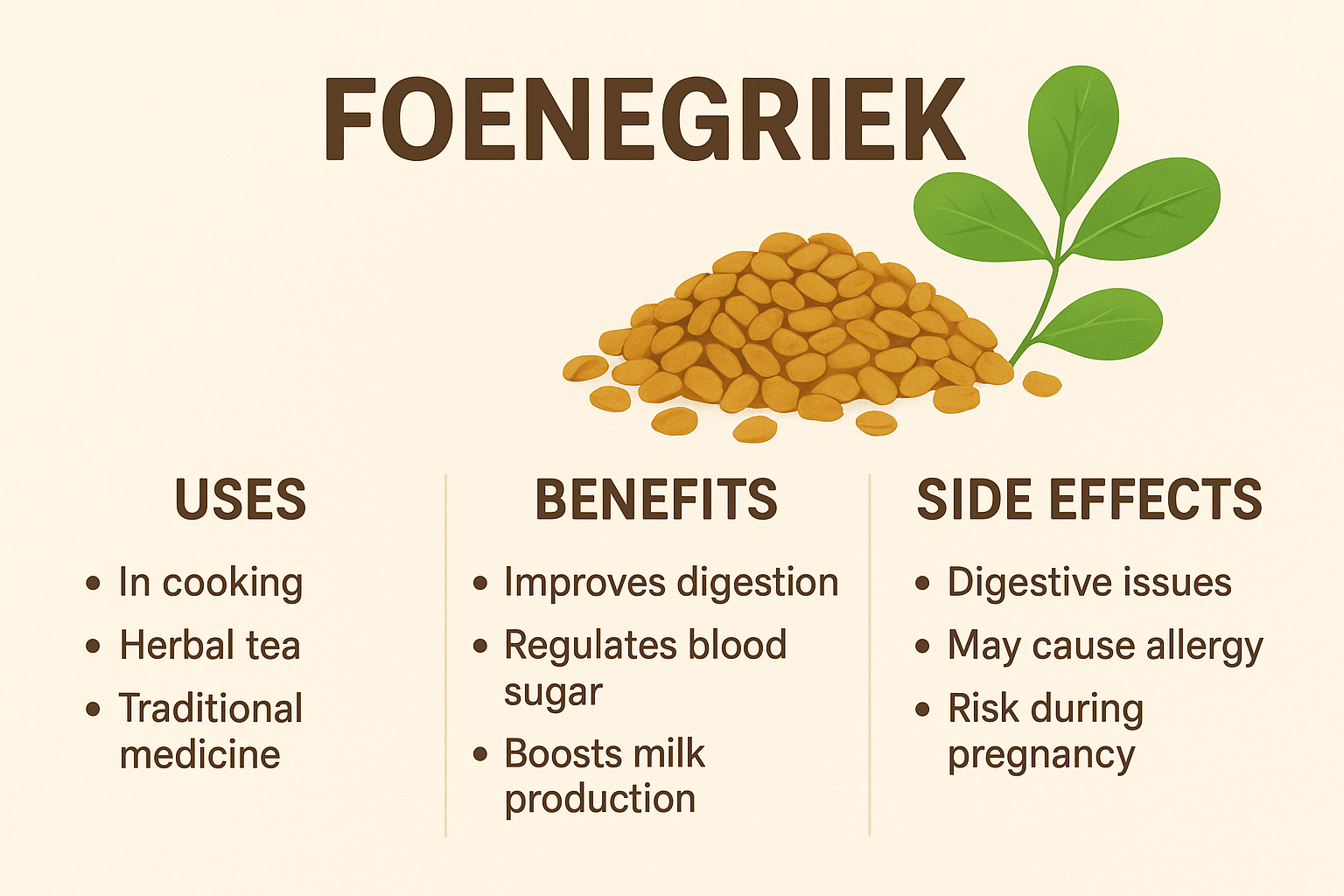Foenegriek is the Dutch name for Fenugreek, a medicinal plant that has been valued for thousands of years across different cultures. In Urdu and Hindi, it is known as Methi Dana (میتھی دانہ / حلبہ). Its scientific name is Trigonella foenum-graecum, belonging to the family Fabaceae (legumes). Fenugreek is widely used in cooking, natural medicine, and as a health supplement.
This article provides complete information about fenugreek, including its history, nutritional value, medicinal uses, health benefits, precautions, and modern research.
🌱 Origin and History
Fenugreek is one of the oldest medicinal plants known to humankind. Archaeological evidence suggests that it was used as early as 4000 BC in the Middle East. Ancient Egyptians used fenugreek seeds for embalming and traditional medicine. In Greek and Roman times, fenugreek was valued as a fodder crop and a health booster.
In South Asia, particularly India and Pakistan, fenugreek has been an essential spice for centuries. Its seeds and leaves are commonly used in curries, lentils, and pickles. In traditional Ayurveda and Unani medicine, fenugreek is prescribed for diabetes, digestive problems, and women’s health.
🌾 Plant Description
Fenugreek is an annual plant, typically growing 30–60 cm tall.
-
Leaves: Green, trifoliate (three-part) leaves, slightly bitter in taste.
-
Flowers: Small, white to yellowish in color.
-
Seeds: Golden-brown, hard, and angular. These seeds are the most widely used part of the plant.
The plant thrives in warm climates and is cultivated in Asia, the Mediterranean, and parts of Africa.
🍽️ Culinary Uses
Fenugreek is both a spice and a herb.
-
Seeds
-
Used in spice blends such as curry powder, garam masala, and pickles.
-
Sprouted seeds are eaten raw or added to salads.
-
Roasted seeds are used in herbal teas and digestive drinks.
-
-
Leaves
-
Fresh fenugreek leaves (methi) are cooked as a vegetable.
-
Dried leaves (known as Kasuri Methi) are used to flavor curries, naan, and sauces.
-
-
Flavor Profile
-
Seeds have a slightly bitter, nutty, and maple-like flavor.
-
When cooked, they develop a sweet aroma similar to caramel or maple syrup.
-
🧪 Nutritional Value
Fenugreek is rich in nutrients that make it valuable both as food and medicine.
Per 100 grams of fenugreek seeds:
-
Calories: 323 kcal
-
Protein: 23 g
-
Fat: 6 g
-
Carbohydrates: 58 g
-
Fiber: 25 g
-
Iron: 33.5 mg (186% of daily requirement)
-
Magnesium: 191 mg
-
Vitamin B6: 0.6 mg
-
Calcium: 176 mg
It is also rich in antioxidants, flavonoids, and saponins, which contribute to its medicinal effects.
💊 Traditional and Medicinal Uses
Fenugreek has been used in traditional medicine for centuries. Some of the common uses include:
-
Digestive Health
-
Seeds soaked overnight are consumed to relieve indigestion and constipation.
-
Its fiber content improves bowel movement.
-
-
Women’s Health
-
Used to increase breast milk production in nursing mothers.
-
Helpful for menstrual cramps and menopausal symptoms.
-
-
Diabetes Management
-
Helps lower blood sugar levels.
-
Improves insulin sensitivity.
-
-
Heart Health
-
Reduces cholesterol and triglycerides.
-
Protects against heart disease.
-
-
Skin and Hair Care
-
Paste of fenugreek seeds is applied to the scalp to prevent dandruff and hair fall.
-
Used in face packs to treat acne and skin inflammation.
-
💪 Health Benefits of Foenegriek
1. Controls Blood Sugar
Fenugreek is well-studied for its role in diabetes management. The soluble fiber in seeds slows down sugar absorption, keeping blood sugar stable. Studies show that daily consumption can lower fasting glucose levels.
2. Improves Digestion
Its high fiber content prevents constipation, bloating, and acidity. Drinking fenugreek water in the morning is a common natural remedy.
3. Boosts Lactation in Mothers
Fenugreek is a natural galactagogue (a substance that increases milk supply). Nursing mothers often take fenugreek tea or capsules.
4. Supports Weight Loss
The fiber in fenugreek seeds helps increase satiety, reduces appetite, and prevents overeating.
5. Reduces Cholesterol
Regular consumption may lower LDL cholesterol while increasing HDL (good cholesterol), thus supporting heart health.
6. Anti-inflammatory Properties
Fenugreek contains antioxidants and compounds that reduce inflammation. It is often used for arthritis and joint pain.
7. Enhances Male Health
Some studies suggest fenugreek supplements improve testosterone levels, energy, and muscle strength.
8. Improves Skin and Hair
-
Skin: Fenugreek paste helps reduce acne and eczema.
-
Hair: Strengthens hair roots, reduces dandruff, and promotes growth.
⚠️ Side Effects and Precautions
Though fenugreek has many benefits, excessive or improper use may cause side effects:
-
Digestive issues: Overconsumption may cause diarrhea, bloating, or gas.
-
Pregnancy risk: Large doses can stimulate uterine contractions and should be avoided.
-
Allergic reactions: Some people may experience skin rashes or breathing issues.
-
Medication interaction: May interact with diabetes or blood-thinning medicines.
👉 Recommended daily intake: 2–5 grams of seeds or as prescribed by a doctor.
🔬 Modern Research
Recent scientific studies support many traditional uses of fenugreek:
-
Diabetes: A study published in the International Journal of Vitamin and Nutrition Research found that fenugreek significantly lowered blood glucose in type-2 diabetics.
-
Cholesterol: Research shows that fenugreek seed powder reduces serum cholesterol and triglycerides.
-
Breastfeeding: Clinical trials confirm its effectiveness in increasing milk production in mothers.
-
Weight Loss: Animal studies suggest that fenugreek extract can reduce fat accumulation.
🥤 Popular Home Remedies
-
Fenugreek Water
-
Soak 1–2 teaspoons of seeds overnight in water.
-
Drink on an empty stomach to control blood sugar and aid digestion.
-
-
Fenugreek Tea
-
Boil crushed seeds in water.
-
Drink warm for sore throat and digestive issues.
-
-
Fenugreek Hair Mask
-
Soak seeds overnight, grind into a paste, and apply to scalp.
-
Rinse after 30 minutes for shiny, strong hair.
-
-
Fenugreek Face Pack
-
Mix seed powder with honey or yogurt.
-
Apply on skin for acne and blemishes.
-
🌍 Global Usage
-
India & Pakistan: Used in curries, pickles, herbal medicine.
-
Middle East: Added to bread and stews.
-
Europe: Used in cheese and as a flavoring agent.
-
United States: Available as a dietary supplement for diabetes, weight loss, and women’s health.
✅ Conclusion
Foenegriek (Fenugreek / Methi Dana) is a versatile herb with a rich history, strong nutritional profile, and wide medicinal benefits. From controlling diabetes and supporting heart health to boosting lactation and improving skin, fenugreek remains a powerful natural remedy.
However, like any herbal supplement, it should be used with caution and in moderation. Consulting a healthcare professional before regular use is always wise, especially for pregnant women, diabetics, or those on medication.



